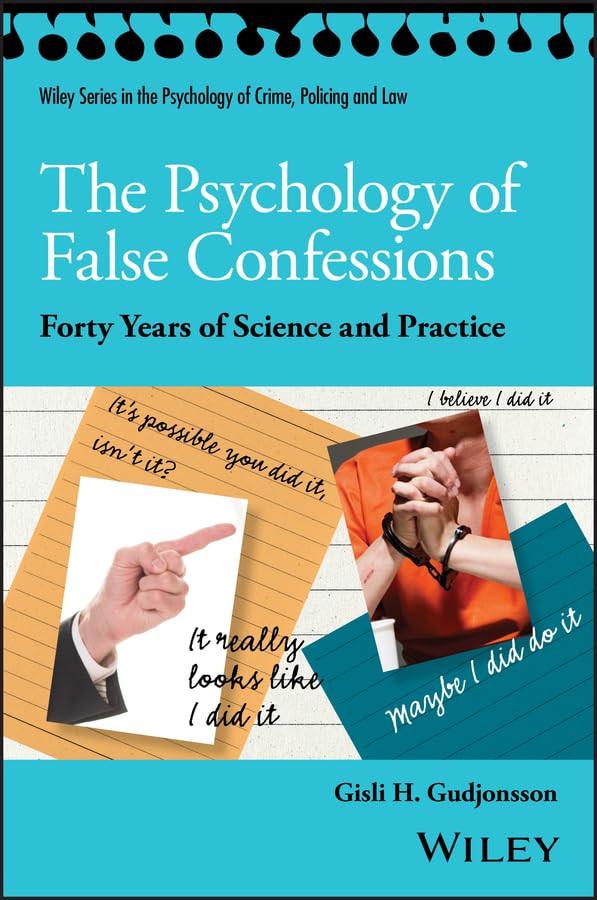Anastaska Кузнецова's Key Ideas from The Psychology of False Confessions
by Gisli H. Gudjonsson
Ideas, facts & insights covering these topics:
6 ideas
·906 reads
5
Explore the World's Best Ideas
Join today and uncover 100+ curated journeys from 50+ topics. Unlock access to our mobile app with extensive features.
Reilly's Case
After allegedly failing a polygraph test and being subsequently interrogated, Reilly was persuaded that he had murdered his mother, of which he was innocent, using words like: ‘Maybe I did do it’, ‘I believe I did it’, ‘It really looks like I did it’, and then saying ‘Yes’ when asked directly, ‘You did it?’. Reilly then signed his written confession statement (Connery, 1977, pp. 65–67; Gudjonsson, 2003a).
12
210 reads
Test And Interrogation
What is apparent is that Reilly had become confused by the result of the ‘failed’ polygraph test and intensive interrogation, believing that he might have murdered his mother, but he always remained unsure (i.e. he was never completely confident that he had murdered his mother; in fact, he harboured serious doubts about it).
Whatever the appalling deficiencies of Peter’s interrogation, it was at least recorded on tape. Indeed, it might be said that one of the factors leading to Peter Reilly’s eventual vindication was the audiotape made during his ruthless grilling;
12
178 reads
Guildford Four
it clearly revealed the browbeating methods of coercion used upon an exhausted boy, and helped many people make up their minds about the police and their subtle brutality.
In the 1980s the main obstacle to preventing and correcting miscarriages of justice involving confession evidence was that people found it hard to believe that anyone would confess to a serious crime of which they were innocent (Gudjonsson, 2003a). That misguided attitude changed considerably after the acquittal of the ‘Guildford Four’ in October 1989 (Ewing & McCann, 2006; Gudjonsson & MacKeith, 2003),
12
141 reads
Guildford Four
a case that opened the gate to other miscarriage of justice cases involving disputed confessions in the UK (Gudjonsson, 2010a). The case represented a long and hard battle (Kee, 1989; McKee & Franey, 1988), but justice prevailed in the end (Victory, 2001). Persistence does pay.
12
125 reads
Need Of Improvement
A part of the early battle was to change negative attitudes and misconceptions by educating police officers, lawyers, and judges about the growing evidence base of false confessions and the need for improved police interview training and practice (Gudjonsson, 1992a, 2003a). The science of the psychology of false confession emerged in the 1980s and 1990s and has continued to develop over time. It has paid dividends in the form of changing the legal landscape in the UK and Norway, but other countries have been slower to respond (Walsh, Oxburgh, Redlich, & Myklebust, 2016).
11
114 reads
False Confessions
A solid theoretical foundation, supported by empirical evidence and case studies, helps us understand the underlying causes of false confessions and how they may be identified, researched, and prevented.
13
138 reads
IDEAS CURATED BY
CURATOR'S NOTE
Cases from Iceland
“
Discover Key Ideas from Books on Similar Topics
3 ideas
Detecting Deception
Aldert Vrij, Pär Anders Granhag, Bruno Verschuere
7 ideas
How to Read a Paper
Trisha Greenhalgh
4 ideas
Detecting Lies and Deceit
Aldert Vrij
Read & Learn
20x Faster
without
deepstash
with
deepstash
with
deepstash
Personalized microlearning
—
100+ Learning Journeys
—
Access to 200,000+ ideas
—
Access to the mobile app
—
Unlimited idea saving
—
—
Unlimited history
—
—
Unlimited listening to ideas
—
—
Downloading & offline access
—
—
Supercharge your mind with one idea per day
Enter your email and spend 1 minute every day to learn something new.
I agree to receive email updates
